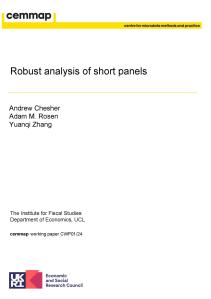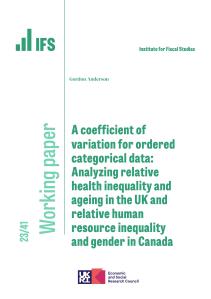Downloads
apc.zip
ZIP | 23.21 KB
<p><p><p>This module can be used within STATA to estimate the coffecients of the linear age−period−cohort (apc) model.</p><p><b>Installation instructions:</b><p><ul><li>Copy the ado file (apc.ado) and the help file (apc.sthlp) into your personal ado file directory. If you do not know where this is type 'sysdir' in STATA. The path listed next to 'PERSONAL' will be the location of this folder.</li><li>Once copied in the command and help file can be called from within STATA in the same way as any other command can. The help file is called by typing 'help apc'. A PDF copy of the help file is available <a href="http://www.ifs.org.uk/docs/apcodeahelpfile.pdf">here</a>.</li></ul></p></p></p>
Authors

Research Associate Yale University
Cormac is a Research Associate of the IFS, an Assistant Professor of Economics at the Yale University and Research Fellow at the NBER.
Resource details
- Publisher
- IFS
Suggested citation
O'Dea, C. (2012). apc: Estimating age, period and cohort effects. London: IFS.
More from IFS
Understand this issue

Gender norms, violence and adolescent girls’ trajectories: Evidence from India
24 October 2022

Empty defence spending promises are a shot in the dark
29 April 2024

Public investment: what you need to know
25 April 2024
Policy analysis

ABC of SV: Limited Information Likelihood Inference in Stochastic Volatility Jump-Diffusion Models
We develop novel methods for estimation and filtering of continuous-time models with stochastic volatility and jumps using so-called Approximate Bayesian Compu- tation which build likelihoods based on limited information.
12 August 2014

Assessing the economic benefits of education: reconciling microeconomic and macroeconomic approaches
This CAYT report discusses the strengths and limitations of several approaches to assessing the effect of education on productivity.
14 March 2013

Misreported schooling, multiple measures and returns to educational qualifications
We provide a number of contributions of policy, practical and methodological interest to the study of the returns to educational qualifications in the presence of misreporting.
1 February 2012
Academic research

Understanding Society: minimising selection biases in data collection using mobile apps
2 February 2024

Robust analysis of short panels
8 January 2024

A coefficient of variation for ordered categorical data: Analyzing relative health inequality and ageing in the UK and relative human resource inequality and gender in Canada
21 December 2023